
|
![]()
Greatest Films of the 1950s
1950 | 1951 | 1952 | 1953 | 1954 | 1955 | 1956 | 1957 | 1958 | 1959
Title Screen Film Genre(s), Title, Year, (Country), Length, Director, Description 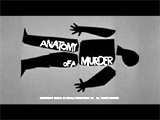


Anatomy of a Murder (1959), 160 minutes, D: Otto Preminger
Director Otto Preminger's daring and controversial courtroom drama was about an explosive rape and murder investigation and trial, based upon a real-life case. The film opened with Saul Bass' stylized designs for the title credits. Army officer Lt. Frederick Manion (Ben Gazzara) was charged with the first-degree murder of the bartender and keeper-owner of Thunder Bay Inn, Bernard "Barney" Quill. Quill had allegedly sexually assaulted Laura Manion (Lee Remick), his attractive wife. Manion turned himself in after shooting and killing Quill an hour after the rape (pre-meditated and cold-blooded), alleging that Quill had raped her. Crafty, country-styled small-town defense lawyer Paul "Pauly" Biegler (James Stewart), more interested in jazz piano and fishing than trying cases, was hired to represent and defend Manion. He received a phone call from Laura Manion asking him to defend her husband in the impending case. When Biegler first met Laura, he noticed her right black eye behind her sunglasses (she claimed it was from a rape incident, although it was also probable her husband slapped her). A doctor had examined Laura and said he didn't think she had been raped. [Note: There was always the possibility that Laura was bartender Quill's lover and that Manion killed him and beat her up when he discovered them together.] Biegler took a strategic tactic - he urged his client to claim that he had no memory of the homicide in the tavern (even though five shots were fired) and to plead temporary insanity (or "irresistible impulse"). Was Manion truly legally sane or insane? Biegler eventually was able to persuade level headed, even-tempered Judge Weaver (Joseph Welch) to rule in his favor and get Laura Manion's rape issue into the record. The tough prosecutor facing Biegler was flamboyant, tough "big city" co-counsel and assistant prosecuting attorney Claude Dancer (George C. Scott), who tried to paint Laura as a trampy, provocative woman. The trial contained daring details, testimony, and evidence regarding contraceptives, rape charges, and the entering into evidence of white or pink nylon lace "lost panties" (allegedly torn off by Quill) - later verified by the inn manager Mary Pilant (Kathryn Grant). She had found them in Quill's laundry chute, and then it was shockingly revealed that Quill was actually Mary's father and she was his illegitimate daughter. In the quick conclusion to the case, Manion was found not guilty (by reason of temporary insanity at the time of the shooting). He unexpectedly left town with Laura (who was seen crying) with only a note for Biegler, explaining that he was seized by an "irresistible impulse" to leave. Evidence at the trailer park in their trash barrel suggested that Manion was a heavy gin drinker who beat Laura before they left (the reason for her tears). It was highly possible that the Manions had duped everyone - Laura's sexual encounter with Quill was consensual (and not rape) and that Manion had killed Quill out of drunken jealousy.


Ben-Hur (1959), 211 minutes, D: William Wyler
Director William Wyler's renowned, Best Picture-winning Biblical epic of enormous scale was the winner of 11 Oscars. The character-driven, action-filled, star-studded extravaganza filmed in Italy was one of the cinema's greatest epics - a compelling human story of revenge, bitterness, redemption and forgiveness. It told about friendship and then adult enmity between boyhood pals. The 1880 novel by Lew Wallace had previously been adapted into an 1899 stage adaptation and into a silent film Ben-Hur: A Tale of the Christ (1925) starring Ramon Novarro. The film's opening was a series of tableaux of Christ's birth and the coming of the Magi, followed by the conquering Romans marching into Jerusalem. The wealthy and influential Prince of Judea, Judah Ben-Hur (Charlton Heston) was reunited with his boyhood friend Messala (Stephen Boyd), newly-appointed Roman Tribune and member of the Roman legions. The two loyal and old friends toasted to each other and expressed their closeness by embracing, and engaging in a friendly spear-throwing contest (exclaiming: "Down Eros, up Mars!"). Messala was potentially Judah's avowed enemy, although they pledged to each other as they crossed arms: (Messala: "It's an insane world, but in it there's one sanity, the loyalty of old friends. Judah, we must believe in one another"). Shortly later, a rift developed between Judah and Messala when Judah was asked to betray his people, turn traitor (and reveal names of Jews who opposed Roman rule) and help Rome: "I'd rather be a fool than a traitor or a killer...Rome is evil....I warn you. Rome is an affront to God. Rome is strangling my people and my country and the whole Earth, but not forever. I tell you, the day Rome falls, there will be a shout of freedom such as the world has never heard before"; Messala offered Judah a choice: "Either you help me or you oppose me. You have no other choice. You're either for me or against me" - and Judah chose decisively: "I am against you!" Judah's family members were falsely accused of treason (after an unfortunate accident during a Roman parade), and Ben-Hur was condemned and sentenced to exile as a slave on a Roman galley ship - Judah vowed revenge: "May God grant me vengeance. I pray that you live till I return." His family members - his mother Miriam (Martha Scott) and his sister Tirzah (Cathy O'Donnell) were banished and enslaved. (Years later, they had contracted leprosy and were confined to the Valley of the Lepers, while Judah believed that they were dead). During a forced march of slaves across the desert, the dehydrated Judah Ben-Hur cried out: "God, help me" in Nazareth - and was given water by a defiant Jesus. Aboard the galley slave ships, Roman Consul Quintus Arrius (Jack Hawkins) noticed Ben-Hur's steely determination - and learned he had already served over three years: "You have the spirit to fight back but the good sense to control it. Your eyes are full of hate, Forty-One. That's good. Hate keeps a man alive. It gives him strength." During a slave galley ship battle against the Macedonians' pirate war ships, Judah was able to miraculously save many of the slaves and Arrius himself - and the Romans were victorious although five ships were lost. Arrius told Ben-Hur: "In his eagerness to save you, your God has also saved the Roman fleet." Judah was adopted by Arrius, and during a spectacular reception scene in Rome, the victorious Arrius and Ben-Hur rode in a chariot together, and were recognized by Emperor Tiberius (George Relph). Judah became a respected citizen and a famed chariot racer under the tutelage of an Arabian horse racer (Hugh Griffith). He finally met his rival Messala in a justly famous 11-minute long chariot race - often regarded as one of the most exciting action sequences ever filmed. The race was prefaced by a lengthy and impressive Parade of the Charioteers, when they paraded around the ring in a display of pageantry; the setting was majestic with a central divider strip composed of three statues thirty feet high, and grandstands on all sides, rising five stories high with immense crowds. Messala suffered a gruesome deathbed scene after his defeat in the arena, when he called for Ben-Hur - delaying an operation to amputate his legs that would attempt to save his life; Messala was bitter and had one last card to play: "Triumph complete, Judah. The race won. The enemy destroyed...What do you think you see? The smashed body of a wretched animal! Is enough of a man still left here for you to hate? Let me help you...You think they're dead. Your mother and sister. Dead. And the race over. It isn't over, Judah. They're not dead...Look for them in the Valley of the Lepers, if you can recognize them. (Messala grabbed Judah's clothing) It goes on. It goes on, Judah. The race, the race is not over." Upon his return to Judea, Ben-Hur was able to rescue his suffering, leprous family from the Valley of the Lepers, with the help of his love interest Esther (Haya Harareet), his steward Simonides' (Sam Jaffe) grown daughter. He also witnessed the crucifixion of Jesus - on his way to Golgotha. In a reversal of roles - Judah followed along behind Jesus as he was being led to his crucifixion, and as the carpenter once gave him water in Nazareth, so did Ben-Hur offer the agonized 'King of the Jews' water when he fell. Ben-Hur's leprosy-afflicted mother and sister were healed by a cleansing rain, and Judah became transfixed and transformed by the power of the crucifixion - he spoke of the miracle to Esther and how he was inspired to convert to Christianity: "Almost at the moment he died, I heard him say it, 'Father, forgive them, for they know not what they do.'...Even then. And I felt His voice take the sword out of my hand." The film's final image was of the high place with three empty crosses as a shepherd drove his flock before the hill.

The Best of Everything (1959), 121 minutes, D: Jean Negulesco
Jean Negulesco's glossy, explosive, and ahead-of-its-time soap opera was an underrated CinemaScopic campy melodrama. Adapted from Rona Jaffe's 1958 best-selling novel, it was the urban equivalent of Peyton Place. One of its most famous quotes was: "Here's to men! Bless their clean-cut faces and dirty little minds!" The influential film was advertised as a cinematic work that: "Nakedly Explores the Female Jungle Where Women Fight and Love Their Way to the Top - To Get the Things and Men They Want!" It also stated in the trailer that: "It undresses the ambitions and emotions of the girls who invade the glamour world of the big city, seeking success, love, marriage, and the best of everything...and who often settle for much less." It was Hollywood's look at the new sexual morality of the time ("This is a story of the female jungle, of the girls who didn't marry at twenty, and of the men who wanted them - but not as wives"). It told about three aspiring young starlet-secretaries in the glamorous world of publishing in New York City, at the Fabian Publishing Company. Its social themes included the world of working women and adultery, love vs. career, unwed pregnancy, abortion, casting couch seduction, and alcoholism. The three struggling yet ambitious working women looking for men to marry (and fulfillment) included secretary Caroline Bender (Hope Lange), naive and virginal April Morrison (Diane Baker), and aspiring actress Gregg Adams (Suzy Parker). The film also implied what might happen to a working woman if she never married - the result would be the ruthless, bitter, unhappy, sterile and calculating editor Amanda Farrow (aging star Joan Crawford), who was engaged in an unsatisfying affair with a married man. The chain-smoking Amanda eventually married an old acquaintance, a widower from Illinois, but was dissatisfied with her new life of domesticity and returned to the work world.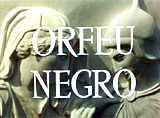


Black Orpheus (1959, Braz./Fr./It.) (aka Orfeu Negro), 100 minutes, D: Marcel Camus
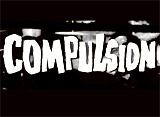



Compulsion (1959), 103 minutes, D: Richard Fleischer
This film-noirish biopic was a modified version of the Nathan Leopold-Richard Loeb case from the mid-1920s, when two 18 year-old killers, law students at the Univ. of Chicago, were defended by famed Clarence Darrow. Likewise in the film set in 1924, two University of Chicago law students, Judd Steiner (Dean Stockwell) and Arthur "Artie" Straus (Bradford Dillman) were both rich, spoiled, and elitist genuises, with a dominant-submissive relationship to each other - Artie was the bullying and sadistic one. [Note: There was also the strong possibility of a homosexual relationship, although that had to be avoided due to censorship of films at the time.] They kidnapped young Paulie Kessler as a thrill, as an attempt to commit the "perfect crime," and as a way to taunt law-enforcement. During the incident, Paulie was killed (by a blow to the head from a blunt instrument), and afterwards his body was drowned in a park. However, Steiner lost his glasses at the crime scene - a crucial piece of evidence. The case was helped by the investigation of their law school colleague Sid Brooks (Martin Milner), who worked part-time for the Globe newspaper. The two killers continued their crime spree - after Straus challenged Steiner to rape Sid's girlfriend Ruth Evans (Diane Varsi), although he didn't carry through with the sexual assault when Ruth reacted with compassion rather than resistance. A tough DA Henry Horn (E.G. Marshall) traced the glasses back to Steiner. The two made a detailed confession and blamed each other, before the case went to trial. Legendary socialist lawyer Jonathan Wilk (Orson Welles) was hired by the defendants' wealthy parents to defend them. During the trial, Horn delivered an opening statement, which was followed by Wilk's shrewd change of the clients' plea to guilty, to eliminate trial by jury. He realized there was overwhelming evidence against his clients, that would assure them of a harsh punishment. For ten days, Wilk introduced psychological evidence to show how mentally ill the two remorseless defendants were, but not insane. He did not want to plead an insanity case (which would also require the jury). He wanted to plead their case solely before the judge. The film's most dramatic and flamboyant moments came during Wilk's closing argument (the longest true monologue in film history) - an eloquent diatribe against capital punishment ("I'm pleading for love"), when he stated that the barbaric practice should be ended. He conceded that his clients were guilty and made an impassioned plea against the state being able to execute the two youths regardless of the severity of their pre-meditated crime. The judge was persuaded - he sentenced the two to life imprisonment, plus 99 years.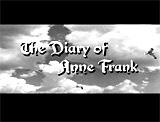


The Diary of Anne Frank (1959), 180 minutes, D: George Stevens

Floating Weeds (1959, Jp. (aka Ukikusa), 119 minutes, D: Yasujirô Ozu
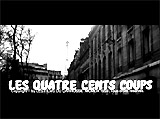

The Four Hundred Blows (1959, Fr.) (aka Les 400 Coups, Les Quatre Cents Coups, The 400 Blows), 97 minutes, D: Francois Truffaut
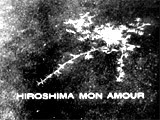

Hiroshima Mon Amour (1959, Fr./Jp.), 90 minutes, D: Alain Resnais


Imitation of Life (1959), 125 minutes, D: Douglas Sirk


North by Northwest (1959), 136 minutes, D: Alfred Hitchcock
Hitchcock's great suspense thriller was another mistaken-identity case involving a Madison Avenue ad executive Roger O. Thornhill (Cary Grant). He was targeted as a US government agent (who didn't actually exist) by international spies, abducted, framed for murder, and chased cross-country. On the run throughout the entire film, he was pursued by the foreign operatives, the head of the spy ring Philip Vandamm (James Mason), the CIA, the police, and a mysterious blonde Eve Kendall (Eva Marie Saint). It ended with a literal plot-twisting cliff-hanger, with other superb sequences including the famous cropduster scene in an open field, and the chase across the face of Mount Rushmore.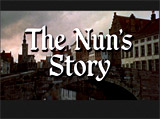
The Nun's Story (1959), 149 minutes, D: Fred Zinnemann
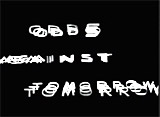


Odds Against Tomorrow (1959), 96 minutes, D: Robert Wise
Director Robert Wise's engrossing, landmark, noirish crime melodrama was the first film noir with a black protagonist (Harry Belafonte, who also produced the film through his own independent company HarBel). The late 1950s B-film's character-driven story, shot on location in NYC, presented cautionary and pessimistic themes, foremost in the era of racial unrest and uncertainty, including volatile bigotry, greed and the weak human impulse toward self-destruction. In the heist film's plot set in the city, three desperate men were teamed up to commit a bank robbery. In the end, they were ultimately stymied by racial tensions and prejudice; one of the criminal members, a white, unstable bigoted ex-con, faced off against the troubled black member of the gang in a deadly, fiery shootout in a fuel storage facility, reminiscent of the conclusion of Raoul Walsh's classic film noir White Heat (1949). In the plot, disgraced, elderly ex-copper and ex-con David Burke (Ed Begley) was able to entice two other desperate men to join him for a small-town bank robbery: bigoted, tough-guy loser-drifter Earl Slater (Robert Ryan), and handsome, black nightclub entertainer Johnny Ingram (Harry Belafonte), who was horse-racing gambling-addicted and was being pressured to pay $7,500 dollars to strong-armed Italian mobster Bacco (Will Kuluva). The troubled and debt-ridden Johnny Ingram was heavily burdened by both the shark-mobster's interest-on-debt payments and his court-ordered alimony payments to his middle-class ex-wife Ruth (Kim Hamilton) who lived uptown with their daughter Eadie (Lois Thorne). The hot-headed Slater, who lived in a two-room apartment with girlfriend Lorry (Shelley Winters), was financially-dependent upon her and felt humiliated and trapped like a "kept" man. Slater had entered into a brief affair with flirtatious, upstairs married neighbor and femme fatale Helen (Gloria Grahame), who had become sexually-excited after cautiously asking him about his dark past and crime of manslaughter. During initial planning of the heist with Burke, Slater often expressed his racist attitude toward the third member of the gang, after initially asking Burke: "You didn't say nothin about the third man bein' a n----r!"; Slater refused to be partnered with a black man but reluctantly went along with the plan. The heist of the First National Bank in upstate Melton, NY was designed to take advantage of weak security on a Thursday evening after hours, when the bank was filled with cash. The plan was botched when Burke with a huge bag of cash exited the building and happened to be spotted by a passing police car. He was lethally shot on the sidewalk, while his two partners were unable to flee the scene in the parked getaway car. Slater, ignoring the original plan (because of his deep distrust of Ingram), had given the getaway car keys to Burke. The two were forced to flee on foot to a nearby oil refinery (with large holding tanks for fuel), as they began firing at each other during a vicious, volatile and confrontational firefight between them. The film concluded with their incineration in the fuel refinery that exploded in flames. The next day, authorities viewed two burned-to-a-crisp bodies and observed how there were no differences between the unrecognizable corpses on stretchers; one asked: "Which is which?" and another replied: "Take your pick"; a damaged sign presented the film's moral lesson: "STOP DEAD END" - it was a cautionary warning about how racial animosity must stop or it would lead to death.

Pickpocket (1959, Fr.), 75 minutes, D: Robert Bresson


Pillow Talk (1959), 105 minutes, D: Michael Gordon
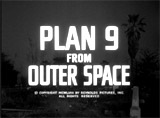


Plan 9 From Outer Space (1957/1959) (aka Grave Robbers From Outer Space), 80 minutes, D. Ed Wood
Although universally acknowledged as one of the 'worst' films ever made, with an incoherent plot, cheap production design and props (e.g., cardboard gravestones, and a paper-plate alien spaceship), nighttime scenes obviously shot during the daytime, inexcusable special effects, and horrible acting, director Ed Wood's sci-fi zombie horror film was still important in cinematic history. It marked the final role for horror icon Bela Lugosi, and some of the film was referenced in Tim Burton's biopic Ed Wood (1994), with Ed Wood played by Johnny Depp. In the film's opening, narrator Criswell (LA TV personality in his feature film debut) spoke directly to the audience to introduce the film's suppressed news story - the arrival of alien invaders from outer space ("My friend, can your heart stand the shocking facts about grave robbers from outer space?"). Onboard a commercial airliner, the pilots spotted a shiny flying saucer high above San Fernando Valley. The UFO saucer landed in a cemetery graveyard in the area, where a burial ceremony was just ending for a grieving old man (Bela Lugosi) whose wife had died. Gravediggers were spooked by the landing, and as they were leaving, they were frightened by the sight of the old man's wife - now a resurrected Vampire Girl (Maila "Vampira" Nurmi), and both of them were killed. The next day, the saddened old man died and was also buried in the graveyard's crypt, but then he was also raised from the dead as Ghoul Man. The police, including overweight Inspector Daniel Clay (Tor Johnson), were alerted to investigate the murder of the two gravediggers. Vampire Girl and Ghoul Man attacked and killed Clay. Flying saucers were also reported in the skies over Hollywood and Washington, D.C. It was then revealed that the extra-terrestrial aliens in the various spacecraft had a strategic plan. Wearing silk pajamas and piloting one saucer, space soldier Commander Eros (Dudley Manlove) and his mate Tanna (Joanna Lee) had been directed by their Ruler (John Breckinridge) to implement a plan known as "Plan 9" (after eight failed plans). Their objective was to stop humanity from creating a doomsday nuclear weapon ("Solaranite bombs" that could destroy the sun) and obliterating the entire universe. The aliens' plan was to use their electrode guns to revive, animate and resurrect the Earth's dead (ghouls or undead zombies) from the graveyard, to serve in a zombie army of the dead to march and conquer Earth and its humans before mankind destroyed itself in a devastating apocalypse. The Pentagon and General Roberts (Lyle Talbot) were aware of the cemetery incidents, had been in contact with the aliens for years, and had made previous attempts to shoot down the alien ships. Reportedly, the aliens had been unsuccessful in the past of convincing earthlings of their actual existence and technological superiority. In the film's climactic conclusion, after a few humans attempted to stop the aliens, their flaming saucer lifted off from the cemetery and exploded over Hollywood. In the film's short epilogue, Criswell returned to warn: "My friend, you have seen this incident based on sworn testimony. Can you prove that it didn't happen? Perhaps on your way home someone will pass you in the dark, and you will never know it, for they will be from outer space. Many scientists believe that another world is watching us at this moment. We once laughed at the horseless carriage, the aeroplane, the telephone, the electric light, vitamins, radio, and even television. And now some of us laugh at outer space. God help us in the future."
Ride Lonesome (1959), 73 minutes, D: Budd Boetticher


Rio Bravo (1959), 141 minutes, D: Howard Hawks
Director Howard Hawks' traditional western was conceived as a rebuking response to Fred Zinnemann's High Noon (1952) and its main character Marshal Will Kane (Gary Cooper). In this film, a self-reliant Sheriff in the town of Rio Bravo, Texas remained a heroic figure who refused to beg others for help. [Note: Two similar remakes by Hawks of the film included El Dorado (1966) and Rio Lobo (1970) - both again starring John Wayne.] The western was set in the small Texas town of Rio Bravo (in Presidio County) in the late 1860s, where tough and heroic Sheriff John T. Chance (John Wayne) arrested Joe Burdette (Claude Akins) for killing an unarmed, innocent bystander in the local El Toro Rojo cantina-saloon. The arrest became problematically dangerous, since Burdette was the brother of wealthy, influential, and powerful rancher Nathan Burdette (John Russell). The vast majority of the film involved interactions between the characters over a prolonged, multi-day siege period, while Joe Burdette was being held in Chance's jail and his brother Nathan and other hired guns (paid with $50 dollar gold pieces) caused trouble and planned a jail-break. Sheriff Chance was determined to keep his prisoner in custody until the US Marshal arrived in six days time. Chance was aided by a strange grouping of individuals who were deputized, outnumbered, and continually besieged: elderly, toothless, crippled ("game-legged"), jumpy but loyal crippled sidekick Stumpy (Walter Brennan), derelict, alcoholic barfly Dude (Dean Martin) (nicknamed Borachon, meaning "drunk") - an ex-deputy, and baby-faced, brave, two pistols-gunslinger greenhorn and singer Colorado Ryan (Ricky Nelson). The Sheriff also became involved in an on-again/off-again 'romance' with attractive, independent, strong-minded and alluring stagecoach passenger and gambler's widow, 22 year-old Feathers (Angie Dickinson), a dance-hall entertainer who became stranded in the town's Hotel Alamo. When wagon-train leader Pat Wheeler (Ward Bond) was murdered in cold blood by one of Burdette's paid assassins, the tenseness of the situation intensified. After a few deadly shootouts and gunfights, there was a final hostage swap (exchanging Dude for Burdette) at Nathan Burdette's creek-side warehouse where Burdette's gunmen quickly surrendered when overcome by Stumpy's clever use of dynamite sticks. In the concluding scene, Sheriff Chance and Feathers finally decided to end their verbal sparring and settle their differences by becoming a couple.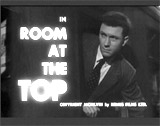


Room at the Top (1959, UK), 115 minutes, D: Jack Clayton

Shadows (1959), 81 minutes, D: John Cassavetes
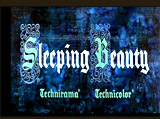

Sleeping Beauty (1959), 75 minutes, D: Disney Studio


Some Like It Hot (1959), 120 minutes, D: Billy Wilder
Director Billy Wilder's wonderfully-satirical, funny comedy spoofed the gangster films of the 1920s (with speakeasies, mobsters, bootlegging, machine-gun fire, and gambling). It has been honored continually as one of the greatest comedies of all time. In the film's opening, two mostly unemployed, late 20's era Chicago jazz musicians in a speakeasy band: saxophone player Joe (Tony Curtis) and bassist Jerry (Jack Lemmon), accidentally witnessed the St. Valentine's Day Massacre (February 14, 1929), and were forced to flee from Chicago hitmen, ordered by notorious dime-flipping, spats-wearing crime-boss ringleader Spats Columbo (George Raft). To disguise themselves and elude the pursuit of retaliatory bootleggers, the two masqueraded as high-heeled, wigged women - Jo-sephine and Daphne - and they joined Sweet Sue's (Joan Shawlee) all-girl band ("Sweet Sue and Her Society Syncopators") with luscious, voluptuous singer Sugar Kane Kowalczyk (Marilyn Monroe) heading for Florida on a train. They soon met fellow band member Sugar (who sang and played a ukelele), revealed to be a lush. Jo-sephine quickly fell in love with Sugar, especially after she told him about her past bad luck with romance and her soft-spot for saxophone players. Once the train arrived in Florida and the band settled into the Seminole-Ritz Hotel, Jerry-Daphne (who was impressed with his own new sexy image) was coaxed by Joe to attract the attention of one of the hotel's guests - the real millionaire - a smitten, oft-wed Osgood Fielding III (Joe E. Brown) in his late 50s, so that Joe could then assume the identity of a wealthy, glasses-wearing Cary Grant-like oil man named "Junior" to manipulatively have Sugar fall in love with him on Fielding's yacht. In one of the film's more hilarious scenes, he pretended to have a problem with impotence to encourage Sugar to seduce him. At the same time, Jerry as Daphne underwent an identity crisis with his alter ego, and after a night of dancing the tango at a club with Osgood, he/she decided to marry him, and they improbably became engaged. Everything was turned upside down when the Chicago hitmen accompanied by Spats arrived at the same Florida hotel for a convention of "Friends of Italian Opera," to disrupt their various gender-bending escapades. In the madcap ending, Spats and his entourage were machine-gunned down by rival gangsters led by Little Bonaparte (Nehemiah Persoff) during a fake birthday celebration (one assassin burst out of a large cake). The film concluded with Joe (who had revealed himself) with Sugar, and Daphne with Osgood as they retreated to the yacht in a speedboat. When Jerry broke the news of his identity by ripping off his wig to the expectant Osgood, the unruffled millionaire replied non-chalantly that he didn't seem to mind: "Nobody's perfect" - the greatest fade-out line in film history.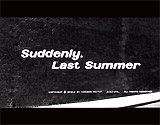

Suddenly, Last Summer (1959), 114 minutes, D: Joseph L. Mankiewicz
Director Joseph L. Mankiewicz's melodramatic and lurid adaptation of Tennessee Williams' 1958 play and Gore Vidal's screen adaptation had to be toned down due to allusions to homosexuality, cannibalism, pedophilia, and incest. Mrs. Violet Venable (Katharine Hepburn), a prominent, rich and elegant Southern belle widow in New Orleans, descended in an elevator into the lobby of her Byzantine-decorated front lobby to speak to Dr. Cukrowicz (Montgomery Clift) about her foundation's financial gift to the Lions View State Asylum, in exchange for the promise of a lobotomy to be performed on her institutionalized niece at St. Mary's - New Orleans debutante Catherine Holly (Elizabeth Taylor). As she toured through her deceased, idolized son Sebastian's outdoor primordial jungle with the doctor, Violet kept hinting about the circumstances of his death (in Catherine's presence in Spain), and how Catherine's "obscene babbling" and lies about her son and his demise needed to be silenced by a lobotomizing brain surgery. Mrs. Venable recalled an earlier trip to the Galapagos Islands (Encantadas) with Sebastian as they witnessed the horrible devouring of newly-hatched young sea turtles by black vultures in the sky, as they dangerously navigated their way back to the sea. Mrs. Grace Holly (Mercedes McCambridge), Catherine's avaricious mother, and Catherine's brother George Holly (Gary Raymond) arrived to follow through on Aunt Violet's generous offer to gather up Sebastian's clothes and wardrobe for the college-bound George. Catherine also described for Dr. Cukrowicz her recollections of a Mardi Gras ballroom incident in which she 'lost her honor' with a married man (who admitted his wife was pregnant). It was the first time that Sebastian noted the power of Catherine's attractiveness. After being transferred by Dr. Cukrowicz to Lions View (with the implicit understanding that her transfer was in exchange for submitting to a lobotomy), she was visited by her mother and brother, who were there to have Catherine sign business papers (demanded by Violet) so they could receive $100,000 in inheritance money - of course, Catherine was horrified and refused. In a stunning scene, the hospitalized Catherine tried to escape and walked across a catwalk in Lions View, where other 'crazed' male inmates reached out to touch her legs from below. In the concluding scene set in the Venable home's jungle-garden, there were impressionistic flashbacks of Catherine's recounting of her day at the beach the previous summer in Spain (Cabeza de Lobo), after her homosexual cousin Sebastian (unseen fully in the film) had bought her a white one-piece bathing suit that became transparent when wet - deliberately used to lure in males for his own pleasure. Catherine delivered a climactic monologue and accounting of a surreal murder scene - a horrifying incident (cannibalistic homicide by ravenous Spanish youths) after Sebastian was chased up a steep set of streets to the ruins of an ancient stone temple where he was ravaged by the young boys (who was assumed to be seeking revenge after being exploited by Sebastian for homosexual encounters). I n the film's conclusion, Mrs. Venable became delusional while Catherine was cured and spared from being further institutionalized and lobotomized.
The World of Apu (1959, India) (aka Apur Sansar, or Apu Trilogy 3), 105 minutes, D: Satyajit Ray


The Young Philadelphians (1959), 136 minutes, D: Vincent Sherman
This bold, lengthy drama was based upon Richard P. Powell's 1956 novel "The Philadelphian." In the film's opening, William Lawrence III (Adam West) of the upper-class Philadelphian family married Kate Judson (Diane Brewster). On their wedding night, he confessed that he was unable to have sex with her - due to his homosexuality (not stated directly in the film). Ashamed, he fled from her and died in an automobile accident. Kate sought comfort and sex with longtime working class friend Mike Flanagan (Brian Keith), and they had a child within the year. The boy, given the last name of "Lawrence" to maintain the family line, became known as Anthony "Tony" Judson Lawrence (Paul Newman), who would eventually become an aspiring lawyer. The secret of his father's identity (and the Lawrence fortune) was kept from him. In law school, Tony's playboy friend Chester "Chet" Gwynn (Robert Vaughn) introduced him to socialite Joan Dickinson (Barbara Rush). Although they fell in love, Joan dumped Tony when she learned that her father Gilbert Dickinson (John Williams) had offered (or bribed) Tony with a position in the prestigious Dickinson law firm, in exchange for postponing marriage to Joan. In spite, she married aristocratic millionaire Carter Henry (Anthony Eisley). Tony acquired a summer law job with John Marshall Wharton (Otto Kruger), the head of another Philadelphia law firm, stealing the position away from fellow student Louis Donetti (Paul Picerni), and he soon acquired a permanent job (as a tax specialist) with the Wharton firm after serving in the Korean War. Due to his expertise and success with wealthy clients (such as Mrs. J. Arthur Allen (Billie Burke)), Tony was made a partner. Then, his often-drunk friend Chet was arrested for first degree murder of his uncle Morton Stearnes (Robert Douglas) - who had a tight clamp on Chet's inheritance. Without criminal trial experience, tax attorney Tony decided to represent Chet. Further complications arose when Tony's parents Kate and Mike revealed the shocking truth of his real parentage to him, and Morton's brother, family patriarch Dr. Shippen Stearnes (Frank Conroy), threatened to publically reveal that Tony's real father was Mike Flanagan if Tony didn't do well. During the trial, Tony took up Chet's defense, while DA Louis Donetti prosecuted the murder case. On the witness stand, one of the last witnesses - Morton Stearnes' butler George Archibald (Richard Deacon) stated that he assumed Chet was drinking alone in the study. Then, he heard a noise and a gunshot. Morton was found dead with a gun next to him, while Chet was nowhere to be seen. During Tony's cross-examination, the butler's testimony was discredited with a failed sniffing test of various drinking glasses. The butler also admitted that he never saw Chet and Morton together in the study. And George also agreed that the noise might have been Chet leaving through the garden gate, long before Morton committed suicide. Then, Dr. Shippen Stearnes revealed that Morton had a brain tumor and was mentally depressed - a major rationale for suicide. The jury ruled that Chet was not guilty of the murder. As a result of Tony's successful defense, a reconciled Joan (whose husband died in the Korean War) and Tony made wedding plans.